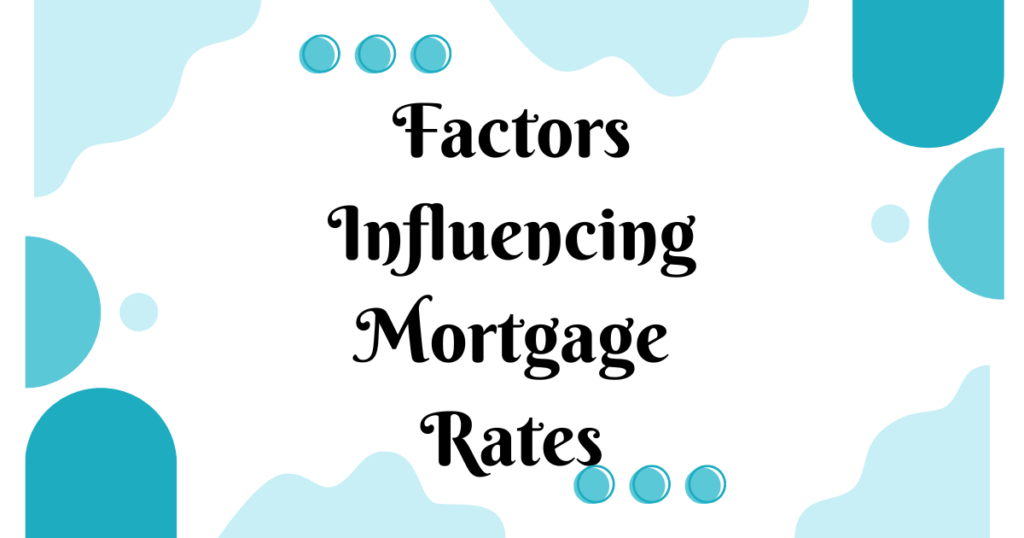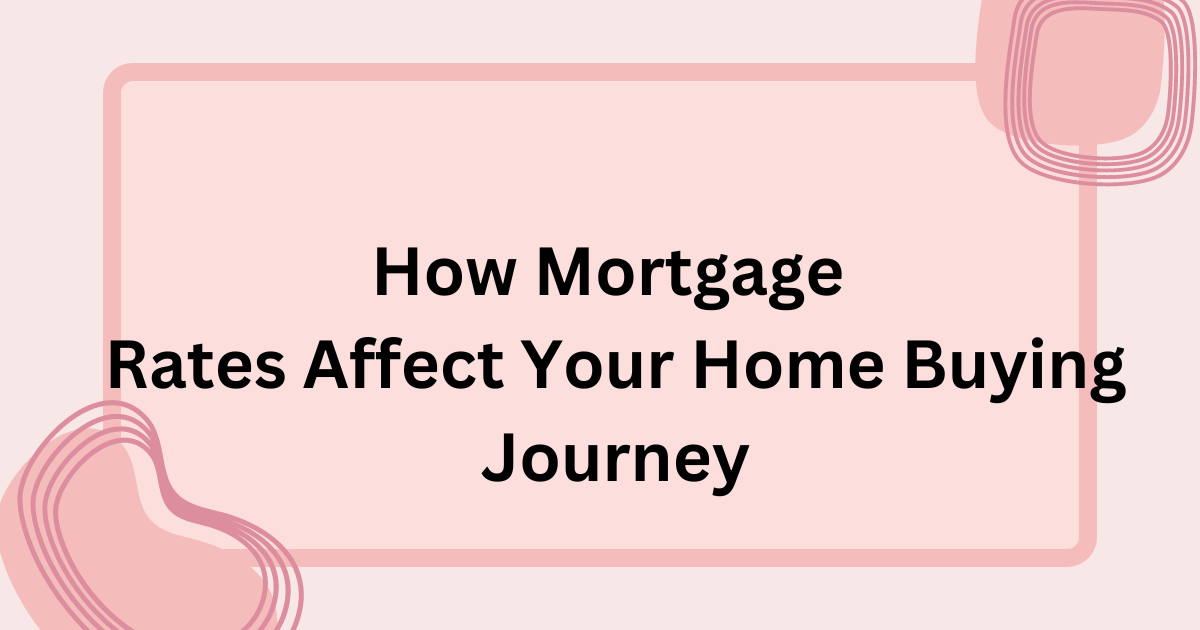When embarking on the journey to purchase a home, one of the most critical factors that can influence your decision is the mortgage rate. Mortgage rates determine the cost of borrowing money to buy a home and can significantly impact your budget, the type of home you can afford, and even the overall success of your home-buying experience.
In this comprehensive guide, we will explore how mortgage rates work, the factors that influence them, and how they affect various aspects of your home-buying journey. By the end of this article, you will have a better understanding of how to navigate mortgage rates to make informed decisions that align with your financial goals.
Understanding Mortgage Rates
Before diving into how mortgage rates affect your home-buying journey, it’s essential to understand what mortgage rates are and how they work.
Mortgage Rate is the interest rate charged by a lender on a home loan. It is the cost you pay for borrowing money to buy a house, and it is expressed as a percentage of the loan amount. Mortgage rates can be fixed or variable:
- Fixed Mortgage Rates: These rates remain constant throughout the life of the loan. If you secure a mortgage with a fixed rate, your monthly payments will not change over time, providing predictability and stability.
- Variable (or Adjustable) Mortgage Rates: These rates can fluctuate over the loan’s term, usually after an initial fixed-rate period. Variable rates are tied to an index and can increase or decrease depending on market conditions, making your monthly payments less predictable.
Factors Influencing Mortgage Rates

Mortgage rates are influenced by a variety of factors, both at the macroeconomic level and the individual borrower level. Understanding these factors can help you better predict rate changes and make informed decisions when locking in a mortgage rate.
1. Economic Indicators
- Inflation: When inflation is high, lenders demand higher interest rates to compensate for the decreasing purchasing power of future payments. Conversely, lower inflation tends to lead to lower mortgage rates.
- Federal Reserve Policy: The Federal Reserve influences mortgage rates through its control of the federal funds rate, which is the interest rate at which banks lend to each other. While the Fed doesn’t directly set mortgage rates, its policies can lead to rate increases or decreases.
- Economic Growth: During periods of strong economic growth, demand for loans increases, often leading to higher mortgage rates. In contrast, economic downturns typically result in lower rates as the Federal Reserve may lower interest rates to stimulate borrowing.
- Housing Market Conditions: The overall health of the housing market, including supply and demand, can also influence mortgage rates. A strong housing market may lead to higher rates, while a weaker market may push rates lower.
2. Lender-Specific Factors
- Lender’s Risk Tolerance: Lenders assess the risk of lending based on the economic environment, housing market trends, and individual borrower profiles. Higher perceived risk typically results in higher interest rates.
- Credit Scores: Your credit score is one of the most important factors in determining your mortgage rate. Borrowers with higher credit scores are generally seen as less risky and are offered lower rates, while those with lower scores may face higher rates.
- Loan Term: The length of your loan term can also impact your mortgage rate. Shorter loan terms, such as 15 years, often come with lower rates compared to longer terms like 30 years because they are less risky for lenders.
- Loan Type: Different types of mortgage loans, such as conventional, FHA, VA, or jumbo loans, come with varying interest rates. Government-backed loans like FHA or VA loans may offer lower rates than conventional loans, especially for borrowers with lower credit scores.
- Down Payment: A larger down payment reduces the lender’s risk, which can result in a lower mortgage rate. Conversely, a smaller down payment may lead to a higher rate.
How Mortgage Rates Impact Your Home Buying Budget
Mortgage rates play a pivotal role in determining how much house you can afford. Even small changes in the interest rate can have a significant impact on your monthly mortgage payments and the total cost of your home over the life of the loan.
1. Monthly Mortgage Payments
The most immediate way mortgage rates affect your home buying journey is through your monthly mortgage payments. These payments consist of both principal (the amount you borrowed) and interest (the cost of borrowing).
For example, if you take out a 30-year fixed-rate mortgage for $300,000 at an interest rate of 4%, your monthly payment (excluding taxes and insurance) would be approximately $1,432. If the rate increases to 5%, your monthly payment would rise to about $1,610—an increase of $178 per month, or $2,136 per year.
2. Total Interest Paid Over the Loan Term
Mortgage rates also determine the total amount of interest you will pay over the life of the loan. The higher the rate, the more you’ll pay in interest, and the more expensive your home will be in the long run.
Using the previous example, at a 4% interest rate, you would pay approximately $215,609 in interest over 30 years. If the rate were 5%, the total interest paid would increase to about $289,884—an additional $74,275.
3. Loan Amount and Home Price
Mortgage rates can also influence the amount you can borrow and the price range of homes you can afford. When rates are low, you can afford a more expensive home for the same monthly payment. Conversely, when rates rise, you may need to lower your home price range to stay within your budget.
For instance, if you’re comfortable with a monthly payment of $1,500 and interest rates are 4%, you might afford a home priced at $314,000. However, if rates rise to 5%, you may only afford a home priced at $281,000.
Timing Your Home Purchase Based on Mortgage Rates
Given the significant impact mortgage rates have on your home buying budget, timing your home purchase can be crucial. Understanding market trends and rate forecasts can help you decide when to lock in a mortgage rate and make your home purchase.
1. Rate Lock
When you find a home and apply for a mortgage, your lender will typically offer a rate lock. A rate lock guarantees that your interest rate will not change for a specified period, usually 30 to 60 days, while your loan is processed.
When to Lock in a Rate: Locking in a rate is advisable if mortgage rates are rising or if you want the security of knowing your rate will not increase before closing. However, if rates are expected to decrease, you might choose a “float down” option, which allows you to lock in a lower rate if rates drop before closing.
2. Market Trends and Rate Forecasts
Staying informed about market trends and rate forecasts can help you make strategic decisions about when to buy a home. If rates are low or expected to decrease, you might accelerate your home-buying timeline. Conversely, if rates are rising, you may want to lock in a rate as soon as possible.
However, predicting mortgage rates can be challenging, as they are influenced by numerous economic factors. Working with a knowledgeable real estate agent or mortgage broker can help you navigate these trends and make informed decisions.
The Role of Mortgage Rates in Your Home Buying Journey
Mortgage rates affect multiple aspects of your home-buying journey, from the type of loan you choose to the neighborhood you can afford. Understanding these impacts can help you plan your purchase and make financially sound decisions.
1. Loan Type and Terms
The mortgage rate you qualify for can influence the type of loan you choose and the terms of your mortgage. For example:
- Fixed-Rate vs. Variable-Rate: If mortgage rates are low, you might opt for a fixed-rate mortgage to lock in a low rate for the life of the loan. If rates are high but expected to decrease, you might consider a variable-rate mortgage to take advantage of lower rates in the future.
- Loan Term: A shorter loan term, such as 15 years, typically comes with a lower interest rate but higher monthly payments. A longer term, like 30 years, has higher rates but lower monthly payments, allowing you to afford a more expensive home.
- Government-Backed Loans: If you qualify for an FHA, VA, or USDA loan, you might secure a lower rate compared to a conventional loan. These loans often have more flexible credit requirements and lower down payments, making them accessible to first-time homebuyers.
2. Affordability and Neighborhood Choice
Mortgage rates directly impact how much you can afford to borrow, which in turn affects the neighborhoods and types of homes available to you. In high-rate environments, you may need to compromise on location, home size, or features to stay within your budget.
- Affordability Calculations: Mortgage lenders use your debt-to-income (DTI) ratio to determine how much you can afford to borrow. Higher rates mean higher monthly payments, which can reduce the loan amount you qualify for and limit your home choices.
- Neighborhood Selection: If mortgage rates are high and your budget is constrained, you may need to look in more affordable neighborhoods or consider homes that need renovation, which could offer better value for money.
3. Long-Term Financial Planning
Mortgage rates also play a role in your long-term financial planning. The rate you lock in will determine your mortgage payments for years to come, impacting your ability to save, invest, and achieve other financial goals.
- Building Equity: Lower mortgage rates can help you build equity faster by reducing the interest portion of your monthly payment. Over time, this equity can be used for home improvements, debt consolidation, or other financial needs.
- Investment Opportunities: If you secure a low mortgage rate, you may have more disposable income to invest in other areas, such as retirement accounts, stocks, or real estate. A higher rate might limit these opportunities, as more of your income will go toward mortgage payments.
Conclusion
Mortgage rates are a fundamental component of the home-buying journey, influencing everything from your budget to the type of home you can afford. By understanding how mortgage rates work, the factors that influence them, and their impact on your home-buying process, you can make informed decisions that align with your financial goals.
Whether you’re a first-time homebuyer or an experienced investor, keeping an eye on mortgage rates and understanding their implications can help you navigate the complexities of the housing market and secure a home that fits your needs and budget. With the right knowledge and planning, you can turn the challenges of fluctuating mortgage rates into opportunities for a successful home purchase.
